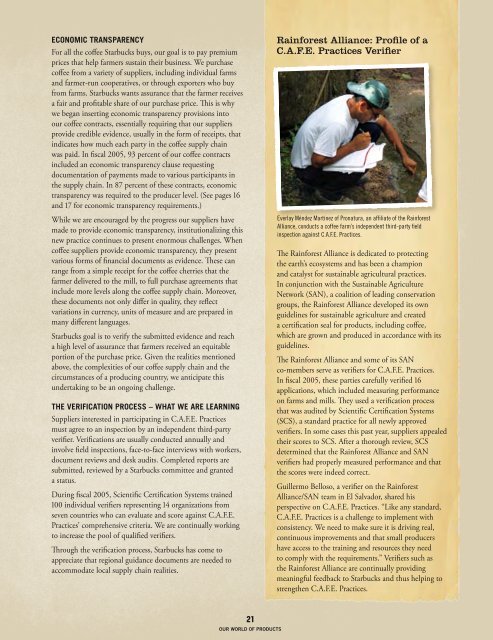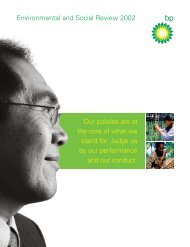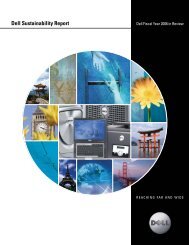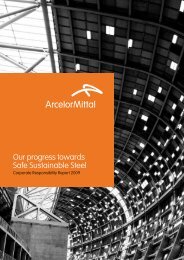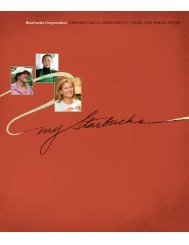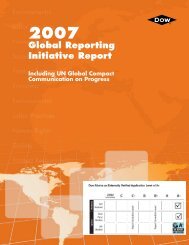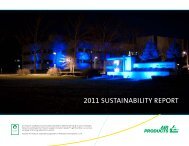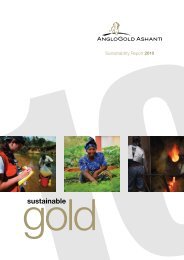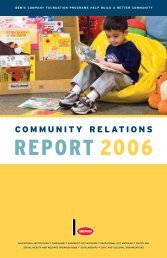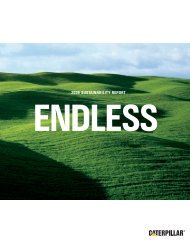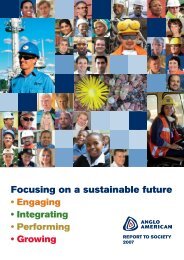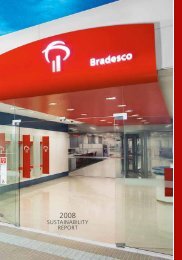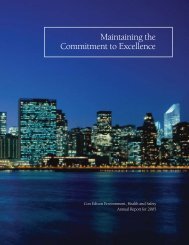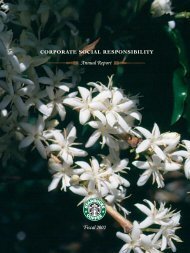Beyond the cup. - Starbucks
Beyond the cup. - Starbucks
Beyond the cup. - Starbucks
You also want an ePaper? Increase the reach of your titles
YUMPU automatically turns print PDFs into web optimized ePapers that Google loves.
ECONOMIC TRANSPARENCYFor all <strong>the</strong> coffee <strong>Starbucks</strong> buys, our goal is to pay premiumprices that help farmers sustain <strong>the</strong>ir business. We purchasecoffee from a variety of suppliers, including individual farmsand farmer-run cooperatives, or through exporters who buyfrom farms. <strong>Starbucks</strong> wants assurance that <strong>the</strong> farmer receivesa fair and profitable share of our purchase price. This is whywe began inserting economic transparency provisions intoour coffee contracts, essentially requiring that our suppliersprovide credible evidence, usually in <strong>the</strong> form of receipts, thatindicates how much each party in <strong>the</strong> coffee supply chainwas paid. In fiscal 2005, 93 percent of our coffee contractsincluded an economic transparency clause requestingdocumentation of payments made to various participants in<strong>the</strong> supply chain. In 87 percent of <strong>the</strong>se contracts, economictransparency was required to <strong>the</strong> producer level. (See pages 16and 17 for economic transparency requirements.)While we are encouraged by <strong>the</strong> progress our suppliers havemade to provide economic transparency, institutionalizing thisnew practice continues to present enormous challenges. Whencoffee suppliers provide economic transparency, <strong>the</strong>y presentvarious forms of financial documents as evidence. These canrange from a simple receipt for <strong>the</strong> coffee cherries that <strong>the</strong>farmer delivered to <strong>the</strong> mill, to full purchase agreements thatinclude more levels along <strong>the</strong> coffee supply chain. Moreover,<strong>the</strong>se documents not only differ in quality, <strong>the</strong>y reflectvariations in currency, units of measure and are prepared inmany different languages.<strong>Starbucks</strong> goal is to verify <strong>the</strong> submitted evidence and reacha high level of assurance that farmers received an equitableportion of <strong>the</strong> purchase price. Given <strong>the</strong> realities mentionedabove, <strong>the</strong> complexities of our coffee supply chain and <strong>the</strong>circumstances of a producing country, we anticipate thisundertaking to be an ongoing challenge.THE VERIFICATION PROCESS – WHAT WE ARE LEARNINGSuppliers interested in participating in C.A.F.E. Practicesmust agree to an inspection by an independent third-partyverifier. Verifications are usually conducted annually andinvolve field inspections, face-to-face interviews with workers,document reviews and desk audits. Completed reports aresubmitted, reviewed by a <strong>Starbucks</strong> committee and granteda status.During fiscal 2005, Scientific Certification Systems trained100 individual verifiers representing 14 organizations fromseven countries who can evaluate and score against C.A.F.E.Practices’ comprehensive criteria. We are continually workingto increase <strong>the</strong> pool of qualified verifiers.Through <strong>the</strong> verification process, <strong>Starbucks</strong> has come toappreciate that regional guidance documents are needed toaccommodate local supply chain realities.Rainforest Alliance: Profile of aC.A.F.E. Practices VerifierEverlay Méndez Martínez of Pronatura, an affiliate of <strong>the</strong> RainforestAlliance, conducts a coffee farm’s independent third-party fieldinspection against C.A.F.E. Practices.The Rainforest Alliance is dedicated to protecting<strong>the</strong> earth’s ecosystems and has been a championand catalyst for sustainable agricultural practices.In conjunction with <strong>the</strong> Sustainable AgricultureNetwork (SAN), a coalition of leading conservationgroups, <strong>the</strong> Rainforest Alliance developed its ownguidelines for sustainable agriculture and createda certification seal for products, including coffee,which are grown and produced in accordance with itsguidelines.The Rainforest Alliance and some of its SANco-members serve as verifiers for C.A.F.E. Practices.In fiscal 2005, <strong>the</strong>se parties carefully verified 16applications, which included measuring performanceon farms and mills. They used a verification processthat was audited by Scientific Certification Systems(SCS), a standard practice for all newly approvedverifiers. In some cases this past year, suppliers appealed<strong>the</strong>ir scores to SCS. After a thorough review, SCSdetermined that <strong>the</strong> Rainforest Alliance and SANverifiers had properly measured performance and that<strong>the</strong> scores were indeed correct.Guillermo Belloso, a verifier on <strong>the</strong> RainforestAlliance/SAN team in El Salvador, shared hisperspective on C.A.F.E. Practices. “Like any standard,C.A.F.E. Practices is a challenge to implement withconsistency. We need to make sure it is driving real,continuous improvements and that small producershave access to <strong>the</strong> training and resources <strong>the</strong>y needto comply with <strong>the</strong> requirements.” Verifiers such as<strong>the</strong> Rainforest Alliance are continually providingmeaningful feedback to <strong>Starbucks</strong> and thus helping tostreng<strong>the</strong>n C.A.F.E. Practices.21OUR WORLD OF PRODUCTS


